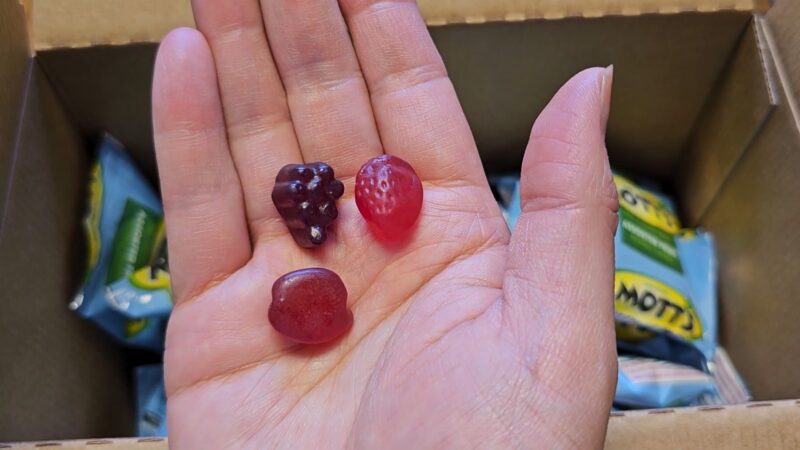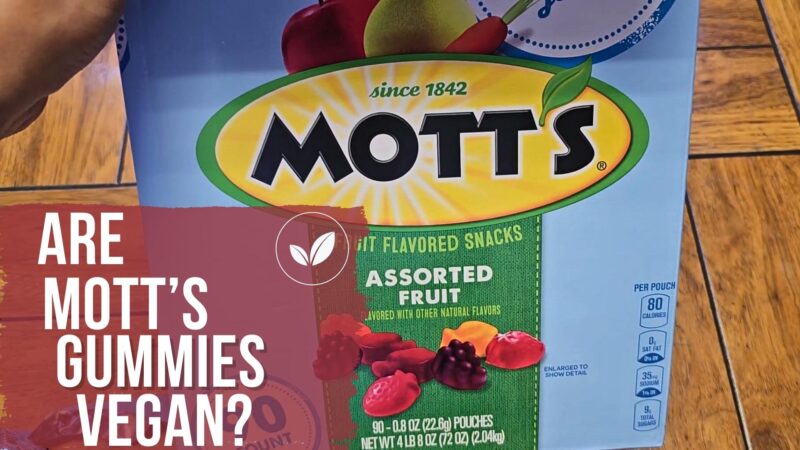In the contemporary era of consumer awareness and dietary choices, Mott’s Gummies have gained significant attention for their delicious taste and perceived health benefits. But, as many people are shifting towards vegan and vegetarian lifestyles, the big question arises: Are Mott’s Gummies vegan? Let’s unpack this conundrum together.
The Basics
The vegan lifestyle, once considered niche, has now permeated mainstream consciousness. Let’s first understand the basic criteria of what makes something vegan and then examine Mott’s Gummies in that light.
Veganism in a Nutshell

It is more than just a diet. It is a philosophy that advocates for abstaining from using animals for food, clothing, or any other purpose. The fundamental reasoning is ethical, but environmental and health motivations also play a role.
- Ethical Reasons: The primary impetus for many vegans. They believe animals have a right to live freely without human interference.
- Environmental Reasons: Animal agriculture is a major contributor to climate change, deforestation, and water consumption. Transitioning to a vegan diet can significantly reduce one’s carbon footprint.
- Health Reasons: Some people turn vegan to lower their cholesterol, reduce the risk of heart disease, maintain an ideal weight, and ensure they are consuming a more plant-based, natural diet.
What Constitutes a Vegan Product?
For a product to be vegan, it should not contain any animal-derived ingredients or by-products. This includes, but is not limited to:
- Gelatin: Often used in gummies, it’s derived from animal collagen.
- Carmine: A red dye sourced from insects.
- Lactose: Sugar from cow’s milk.
- Honey: Produced by bees.
Understanding these basics sets the stage for our exploration of Mott’s Gummies. So, let’s delve deeper.
Mott’s Gummies: Ingredients Breakdown

Before jumping to conclusions, it’s vital to scrutinize the components that make up Mott’s Gummies. By doing so, we can make an informed judgment on its vegan status.
Main Ingredients
Mott’s Gummies, as with many gummy products, contains a blend of sugars, natural flavors, and other components to create its signature taste and texture. Some of the main ingredients include:
- Corn Syrup: A sweetener derived from corn starch. Vegan.
- Sugar: Can be vegan, but some sugars are processed using bone char. The source and processing method matters.
- Natural Flavors: Can be plant-based or animal-derived. Without specifics, it’s a gray area.
Potential Non-Vegan Ingredients
The gray areas in the ingredient list can be potential pitfalls for those trying to maintain a strict vegan diet. Some of the ambiguous ingredients to be aware of:
- Gelatin: As mentioned earlier, gelatin is frequently found in gummy products. It’s derived from boiling skin, tendons, ligaments, and bones of animals.
- Natural and Artificial Colors: These can sometimes be sourced from animals. For instance, carmine, used for red coloring, is made from crushed insects.
- Vitamin D3: Often derived from lanolin, the grease from sheep’s wool.
So, Are Mott’s Gummies Vegan?
After looking at the components, it’s time to draw a conclusion. Here’s what we found out about Mott’s Gummies.
Official Statements
Mott’s has not officially labeled their gummies as vegan. This absence of certification can be due to the presence of non-vegan ingredients or the potential cross-contamination during the manufacturing process.
Analysis and Recommendations

Considering the ingredients and the lack of official vegan certification:
- Not Strictly Vegan: Mott’s Gummies contain gelatin, which is a clear non-vegan ingredient. Additionally, other components may be of animal origin or processed using non-vegan methods.
- Cross-contamination: Even if Mott’s were to remove gelatin, without a vegan certification, cross-contamination can’t be ruled out.
- For Vegans: It’s advisable to opt for gummies that are clearly labeled as vegan. There are numerous alternatives in the market which provide the assurance of being 100% plant-based.
Exploring Alternatives
Finding the right vegan gummy can seem like a daunting task, especially if you’ve had a favorite go-to snack. But fear not! The market is teeming with alternatives that are just as delightful.
Characteristics of Vegan Gummies
To ensure you’re getting a genuine product, here’s what you should look out for:
- Plant-Based Gelling Agents: Instead of gelatin, look for gummies that use pectin (derived from fruits) or agar-agar (a seaweed derivative).
- Transparent Ingredient List: Brands committed to vegan values will typically be transparent about their ingredients. Labels should be clear and devoid of any ambiguities.
- Certifications: Keep an eye out for labels like “Certified Vegan” or “100% Plant-Based”. Such certifications offer an added layer of assurance.
Popular Vegan Gummy Brands
The surge in veganism’s popularity has led to the emergence of brands dedicated to offering various treats. Here are some top contenders:
- Surf Sweets: Known for their organic gummies, they utilize pectin instead of gelatin.
- YumEarth: A brand recognized for its transparency, offering a wide range of treats.
- Annie’s: Their Organic Bunny Fruit Snacks are gelatin-free and a hit among many consumers.
Why Vegan Gummies Matter

Beyond personal dietary choices, choosing vegan gummies taps into a broader conversation about sustainable consumption and ethical choices.
Environmental Impact
Switching to vegan gummies isn’t just about a dietary preference. The production of plant-based snacks tends to have a lower environmental footprint:
- Water Usage: Animal agriculture, from which gelatin is derived, is notoriously water-intensive. In contrast, plant-based alternatives usually consume less water.
- Land Use: Producing gelatin requires more land as compared to cultivating ingredients for vegan gummies, contributing to deforestation and habitat loss.
Animal Welfare
Choosing vegan gummies is also a stand against the inhumane treatment of animals. By supporting vegan products:
- You Discourage Factory Farming: Where animals often live in cramped conditions and suffer throughout their lives.
- Promote Ethical Standards: Your purchase power can encourage brands to adopt cruelty-free practices.
FAQs
Are there other common non-vegan ingredients to watch out for in candies besides gelatin?
Yes, besides gelatin, candies can contain other non-vegan ingredients such as beeswax (used as a glazing agent), shellac (a resin secreted by the female lac bug, also used for glazing), and milk derivatives (like milk fat or milk chocolate). It’s essential to read ingredient labels thoroughly to ensure candy is vegan-friendly.
I’ve seen gummies labeled as vegetarian but not vegan. What’s the difference?
Gummies labeled as vegetarian may still contain ingredients not considered vegan. For instance, they might be free from gelatin but could contain other animal by-products like honey or beeswax. Vegan gummies, on the other hand, ensure that no animal-derived ingredients are included at all.
Why isn’t bone char considered vegan if it’s just used in processing and not present in the final product?
The vegan philosophy is rooted in avoiding exploitation and cruelty to animals. Bone char is derived from the bones of animals, and its use directly supports industries that harm animals. Thus, even if it’s not present in the final product, the process of using bone char goes against vegan principles.
How can I find out if the sugar in a product was processed with bone char?
The best approach is to contact the manufacturer or brand directly. They can provide information on their sugar sources and processing methods. Another option is to look for organic sugars or those labeled as “unrefined” or “raw,” as these typically do not use bone char in processing.
Are there health benefits to consuming vegan gummies compared to regular gummies?
While vegan gummies avoid animal-derived ingredients, it doesn’t automatically make them healthier. They can still contain high amounts of sugar or artificial additives.
However, vegan gummies might offer advantages in terms of avoiding potential allergens found in animal products and aligning with ethical consumption.
Are vegan gummies more expensive than non-vegan alternatives?
Not always, but often, vegan gummies might be priced slightly higher due to the cost of plant-based alternatives and the niche market they cater to.
However, as the demand for vegan products rises, economies of scale can lead to competitive pricing, making vegan gummies more accessible to a broader audience.
Final Words
Navigating the world of veganism can be a maze, especially with products like gummies that are often in the gray zone. Mott’s Gummies, while delicious and popular, do not fit the strict criteria mainly due to the presence of gelatin and the ambiguity surrounding other ingredients.
For those committed to the vegan philosophy, the journey continues toward finding the perfect gummy treat!

